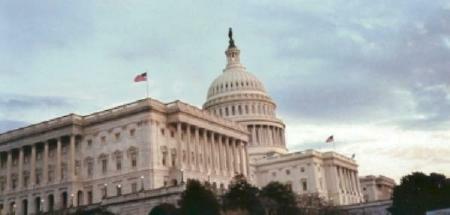 Stockphoto.com Tiny U.S. piggy bank can't pay Downsize the GovernmentThere has been much talk in recent years about a president's "legacy." This usually means a new, large, and very expensive government program. Yet when we are deeply in debt--almost $20 trillion--it seems odd to add more programs that we can't afford. What we need instead is a president who will lead a careful review of current government programs and call for reducing ones that are too large and ending ones we can do without. There will be howls of resistance at decision-time on specific programs, because: ✓ Well-funded and powerful interest groups lobby to keep and expand old progams and to establish new ones; they also give truckloads of campaign money to candidates who support their demands ✓ Members of Congress want to "bring home the bacon" of federal dollars to their districts and states; doing so is a huge part of their re-election campaigns ✓ The recent practice of naming buildings, programs, highways--and even the occasional aircraft carrier--for politicians who are still living may be a key incentive for some  A major culprit in reckless spending On the other hand, many citizens know that the public debt is way out of control. They realize that many federal-government programs, while well-intended, do not accomplish very much and that some do real harm. Many others, while useful, could be done by the states or by private groups. There are ways to ease the transition to a smaller federal government. Business and farm subsidies can be phased out over a period of two or three years, so that business practice and the markets can adjust. Subsidies to state governments can be reduced, and some can be phased out entirely. Federal employees who face job loss can be offered the free help of top placement experts so they can find good work elsewhere. As the country's chief executive, the president should lead the review and should have cabinet members assign able people to lead departmental reviews. Through State of the Union addresses, special messages to Congress and the public, and use of the veto power where needed, the president can give strong leadership on downsizing. Key review questions should include: ✓ What programs should be ended because they are obsolete--or because they just cost too much and produce too little? ✓ Why does one agency run a program that undermines another agency's program? An example: The Department of Agriculture subsidizes crop insurance for tobacco farmers--thus undermining anti-smoking campaigns run by the Department of Health and Human Services. ✓ To save great sums of money and to reduce federal meddling in state affairs, shouldn't we start phasing out most federal subsidies to state and local governments? Tax dollars used for these subsidies lose much of their value after they go to Washington. Taking a large chunk of the money for administrative costs, the feds send reduced amounts back to the states with lots of new regulations attached. Besides losing many dollars, citizens thus lose much of their control over their state and local governments. ✓ Shouldn't education policy be set by the states and by local school boards, instead of having top-down--and very expensive--mandates such as No Child Left Behind and Common Core? The current obsession with testing certainly helps the testing industry, but it's of dubious value to students. What students really need is teachers who know their subjects and love to teach. State and local education leaders--ones who listen to parents--are in the best position to find and keep such teachers. ✓ What programs are valuable, but should be run by private groups and with private funding? Some research done by the Census Bureau should instead be done by business and political groups, since they are the main beneficiaries of the research. We should also return to mainly-private funding for arts and entertainment. Amtrak's passenger trains are worthwhile, but should operate without government subsidy. Like other business subsidies, the Amtrak one could be phased out over several years. ✓ Can't we downsize some welfare programs as we raise the federal minimum wage? Congress could phase in reduction of some welfare programs (such as free food) as it phases in a higher minimum wage. In a sense, welfare programs subsidize businesses that pay such low wages that their employees can't meet basic living costs. A higher minimum wage would make it possible for many people to earn, for the first time, a real living. The program review could benefit from the Clinton-Gore administration's "reinventing government" experience. Dr. Elaine C. Kamarck headed the project in its early years. In 2013 testimony before a congressional committee, she said it saved the government $136 billion, cut government rules substantially, "closed 2,000 obsolete field offices, eliminated 250 programs and agencies..." It also made remaining government agencies more citizen-friendly. There are, of course, strong ideological differences on some issues of government spending. Republicans often want to cut domestic programs, but spend more on the military. Some Democrats reverse those priorities. Libertarians want to cut just about everything--and to drop many programs altogether. There are links below to different approaches. There is, though, no need for everyone to agree on why they want to close a federal program. One person might see it as both unwise and unconstitutional. Another might believe its goals are good, but that states can do the job better. A third might stress the public-debt problem and say, "We just can't afford it. Let's bite the bullet." The plain language of the last person calls to mind another point. Management experts have their own language; they put much stress on "metrics" and other technical terms. But anyone who attempts the awesome work of reforming the U.S. government should also remember blue-collar wisdom: "The right tool for the job...Do it right the first time...If it ain't broke, don't fix it...If it is broken, fix it right away--before it gets worse." The program review should also identify government assets that are no longer needed. They should be sold to help rescue us from chronic deficits and crushing public debt. Such assets include office buildings that could be converted to private use. They include surplus military bases--both here and overseas--that could be sold to local groups for conversion to factories, farms, or university campuses. The review should examine the vast federal property in our western states. According to a recent report by the Congressional Research Service, the federal government owns a stunning 46 percent of the land in the eleven contiguous western states. This includes 46 percent of California and nearly 80 percent of Nevada. The feds also own 61 percent of Alaska. We do not suggest selling the Grand Canyon or the great national parks of Mesa Verde, Yosemite, and Yellowstone! But we do suggest selling some of the feds' pasture and forest land and using the proceeds for federal-debt retirement. This certainly would help Uncle Sam. And people in our West would be happy to own more of their own states. With skilled staff, strong leadership from the president, and steady pressure on Congress, the program reviews would help balance the budget each year and help pay down the public debt. LINKS FOR MORE INFO: Cato Institute, "Downsizing the Federal Government," www.downsizinggovernment.org Charles S. Clark, "Reinventing Government--Two Decades Later," Government Executive (govexec.com), April 26, 2013 Congressional Research Service, "Federal Land Ownership: Overview and Data," March 3, 2017 Jeffrey Dorfman, "Where Republicans Should Start Downsizing Government," realclearmarkets.com, Jan. 12, 2015 Elaine Kamarck, "Leading Change: The Convergence of Politics & Policy" (video), Harvard School of Public Health, March 11, 2014 George Leef, "Buckley's 'Modest Proposal' Would Erase 18% of the Federal Budget," www.forbes.com, Jan. 12, 2015 National Priorities Project (Northampton, Mass.), www.nationalpriorities.org Caroline Porter, "Fight Is On for Common Core Contracts," Wall Street Journal, Nov. 12, 2014 Alan Singer, "Common Core: It Really Is All About the Tests (and Corporate Profits)," HuffingtonPost.com, Nov. 17, 2014 John Basil Utley, "16 Ways to Cut Defense Spending," The American Conservative, Feb. 22, 2013. |